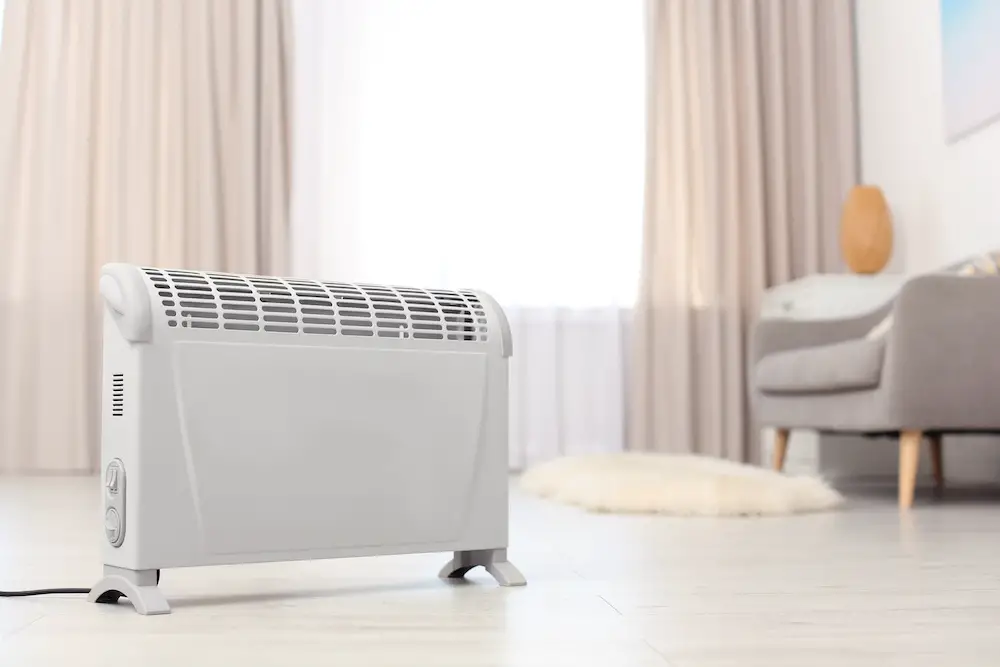In places where winters are a way of life, a reliable heating system is essential in every home. Even with a central system, you still need an alternative way to heat if the central fails.
More than anything, a big chunk of energy costs accounts for heating.
The most widely applied heating methods include the use of space heaters and centralized heating systems.
If you compare using a space heater vs central heat, you will need to consider many factors.
These include outdoor temperatures, the house’s location, and the heater’s efficiency, among many other things.
We’ll discuss the different heating systems, their tradeoffs, and what to look for when choosing between space heaters vs central heat.
- What Are Combustion Heaters?
- What Are Electric Heaters?
- Comparing the Different Types of Heating Systems
- Space Heater vs Central Heat: Which Is Cheaper?
- Do Space Heaters Make Your Electric Bill Go Up?
- Which Type of Heater Is Cheapest To Run?
- The Benefits of Insulation
- Is It Cheaper To Use a Space Heater Than Central Heat?
What Are Combustion Heaters?
Combustion heaters are more cost-effective than electric heaters, but they bring serious fire hazards to your home.
There are two types of combustion heaters: vented and unvented.
Vented
Manufacturers and builders design vented heaters for permanent positioning next to an exterior wall.
This way, the vent goes through the ceiling or wall to open air.
The chimney is the simplest example of a vented space heater. It uses firewood, and the duct to a roof or an outside wall vents the fumes outside.
Some vented heaters use a sealed combustion process, which draws air from the outside into the combustion chamber.
Sealed combustion heaters are much safer to use because they do not affect indoor air quality.
Open units draw and deplete the oxygen supply from within an indoor space and use it for the combustion process.
Central heating systems that use combustion have built-in vents that transfer flues out to the open air.
Unvented
Vent-free combustion heating units are not good for indoor use.
This is because they produce fumes, deplete indoor oxygen reserves, and make spaces uninhabitable.
Fumes produced include carbon monoxide, nitrogen dioxide, acid aerosols, and other hazardous particle residues.
In fact, most US states have banned the use of unvented kerosene heaters indoors.
Given a choice between a combustion space heater vs. an electric heater, most will go for a combustion unit.
If you do, remember to pick vented units for indoor use.
What Are Electric Heaters?
Central heat or space heaters that use electricity do not produce harmful residues like combustion heaters.
As such, no venting is necessary when it comes to heaters that purely use electricity.
The problem is electric space heaters share the fire hazards attributed to combustion heaters up to some degree.
Since electric heaters do not produce fumes, they are best for operating inside homes and maintaining indoor air quality.
There are also two types of electric heaters: convection and radiant.
Convection Heating
In convection heating, the unit heats the air in its fan’s blowing direction.
A convection heater transfers a part of its heat energy to the ambient air using the laws of thermodynamics.
The best types of convection space heaters are the ones that use a heat-transfer liquid, such as oil.
The transfer liquid stores heat, providing a more constant heat source and allowing the heating element to save energy by cycling less.
Radiant Heating
Radiant heating heats the walls in a room and all solid or liquid objects in its path using infrared radiation.
Infrared rays are electromagnetic waves, but the wavelengths of radiant heating waves are completely safe.
Unlike the thermodynamics principles of convection heating, radiant heating uses quantum mechanics.
Space heaters that use radiant heating provide better thermal comfort than convection heaters.
With an infrared heater, the indoor air stays cool since it remains permeable to the radiant source’s heat rays.
Radiant heating is more energy-efficient than convection heating.
Because it heats objects and not the air in the room, it only consumes a small amount of energy to reheat after air exchanges.
Comparing the Different Types of Heating Systems
Heat energy can come from many fuel sources.
For residential heating, the most widely used fuel sources are electricity, gas, heating oil, coal, wood, or wood pellets.
To save on heating costs, you first have to know the difference between a space heater and a centralized system, as well as an electronic and combustion unit.
Central Heat vs Space Heater
A space heater is a small, portable heating device that does not have transfer ducts for heat energy.
You typically use a space heater to warm a single room or a small space within a room.
Space heaters vary in size, shape, capacity to heat, and heating coverage.
Larger units may have bigger heating elements that can warm a space faster than smaller space heaters.
In comparison, a central heating system heats all parts of a home.
It has heat transfer ducts for distributing heat energy from a central source to different parts of the house.
Central heat is the most popular type of heating system used in the United States.
Smart homes may even have centralized heating systems that incorporate controls for individual rooms.
With smart controls, you may turn down the heat in specific rooms to divert more heat gain in select spaces.
Combustion Space Heater vs Electric Heater
Central heating systems and space heaters have versions that use either combustion or electricity as the primary energy source.
While typical central heat normally powers up with gas or electricity, some systems use heating oil, coal, or wood.
Systems that use gas, coal, and firewood run through combustion.
In comparison, space heaters also use the same fuel sources but on a smaller scale.

Space Heater vs Central Heat: Which Is Cheaper?
Are space heaters cheaper than central heat?
When looking to purchase an immediate solution for your heating needs, it is always safe to say that a single-space heater is cheaper than installing central heat.
Even using several space heaters can be cheaper than a single central system.
Still, when it comes to energy consumption, central heat is always the better way to heat an entire house.
If you can live throughout the winter with heat in just one room, using a space heater is far more affordable than central heat.
With that said, are space heaters cheaper than central heat?
The answer is both yes and no.
Using a space heater is cheaper if you only use one sparingly and in a specific small area in your house.
Is the central heat in your home is programmable, where you can turn it down or off in unused spaces?
If so, it would remain cheaper than using several space heaters in different rooms.
Do Space Heaters Make Your Electric Bill Go Up?
Every space heater has its own power rating.
The use of low-wattage space heaters would cause noticeable differences in your electric bill.
This increase in energy costs can go much higher if you keep using a high-wattage space heater.
Imagine using a water heater, a washing machine, an air conditioner, or a freezer with a large compressor.
The energy costs of using a space heater can be very similar.
Portable space heaters have not yet come a long way in innovation since their conception.
Keep in mind that anything that uses large amounts of electricity leaves a large carbon footprint on the environment.
The US Environmental Protection Agency still has no plans to label space heaters with the Energy Star qualification.
If a product is not Energy Star-qualified, it doesn’t meet the basic energy efficiency requirements.
Which Type of Heater Is Cheapest To Run?
Since you already know the differences between space heaters vs central heat, you can decide better by learning which types are the cheapest to run.
With central heating, systems that purely use combustion are still cheaper to run than electric systems.
The price of electricity keeps climbing, and kerosene and natural gas prices pretty much rise with it.
Even so, if you look at it closely, natural gas is still cheaper than electricity.
The same is also true with space heaters.
Vented combustion space heaters run at a fraction of the cost required for electric space heaters.
While combustion heaters provide a more affordable solution for operating costs, they may be much more expensive initially.
If you want an immediate, cheap solution for your heating requirements that you will use sparingly, go for electric space heaters.
The Benefits of Insulation
Insulation goes a long way in reducing your heating requirements.
It ultimately reduces the energy costs required for heating your home by maximizing heat gain and decreasing heat loss.
To make your choice between space heating and central heat a lot easier, you might want to consider fixing your insulation problems.
Adding insulation may not be an easy solution because of all the crawl spaces you may have to insulate.
Nevertheless, it will surely help minimize your electric bill.
Is It Cheaper To Use a Space Heater Than Central Heat?
Consider all your options before choosing between a space heater vs central heat. The best practice is to use both central heat and spot heating, and find the right temperature settings to maintain. Large temp swings cost more than small temp swings.
There are times when using a space heater will cost less than turning up central heat, and vice versa.
It is not good practice to heat every room in your home with several space heaters.
Doing so will jack up your utility bills, making you wish you should have just grabbed more blankets and put on more clothing.
It is also not advisable to keep central heat running in all rooms if you can turn down the heat in unused spaces.
If you stay in one room for an extended period and no one else is in the house, use space heating and turn down the central heat.

